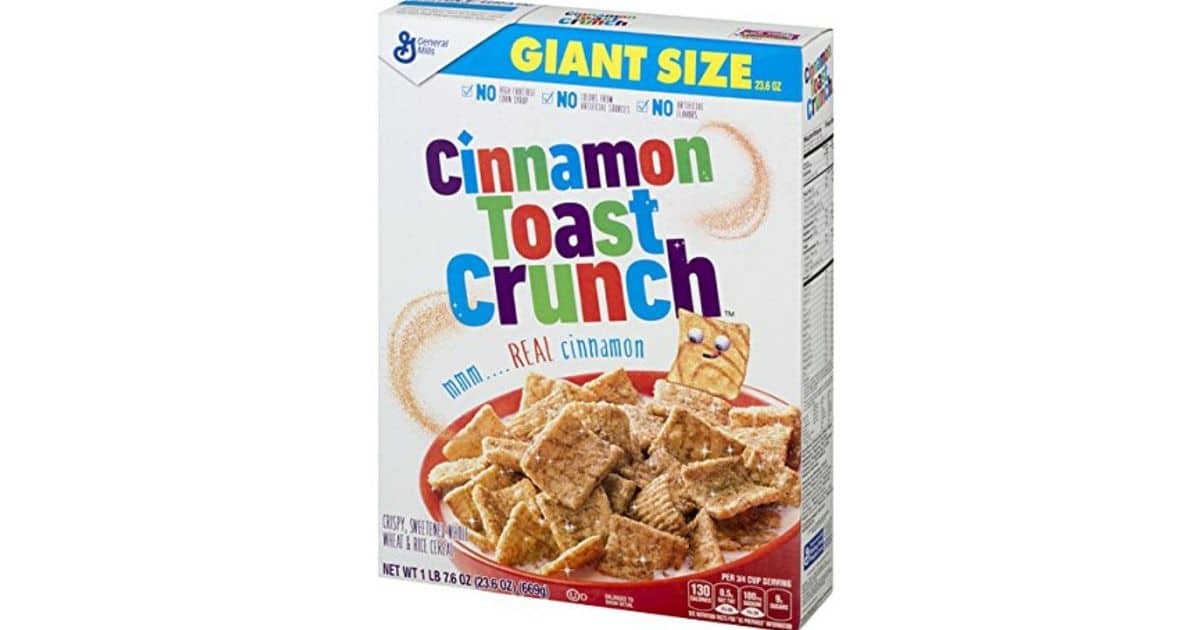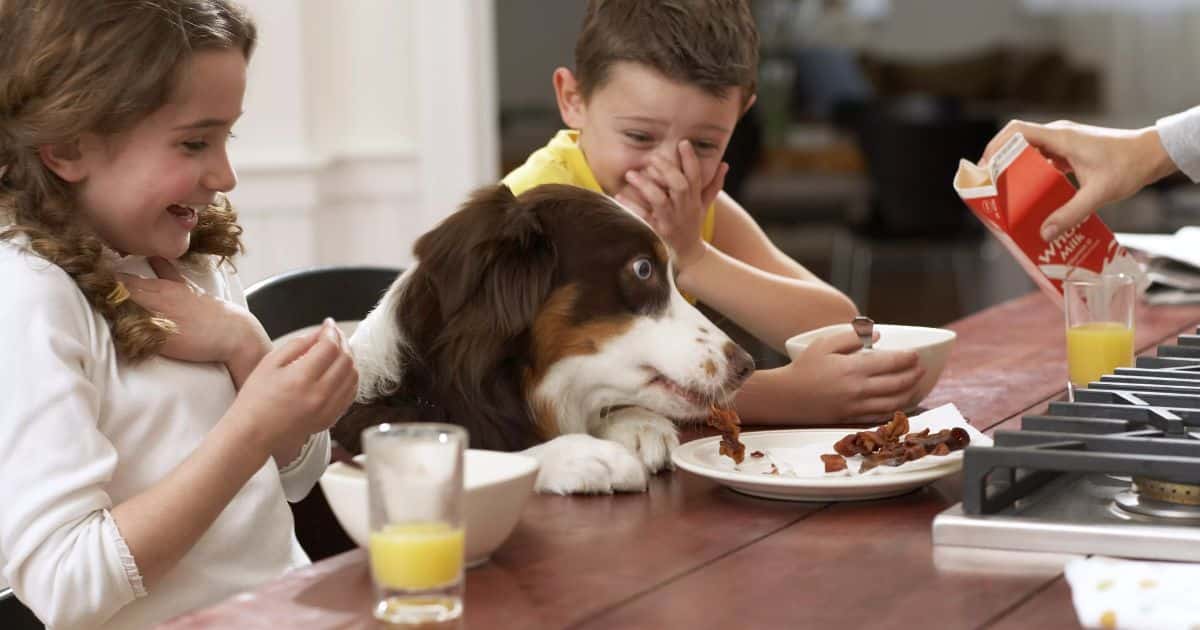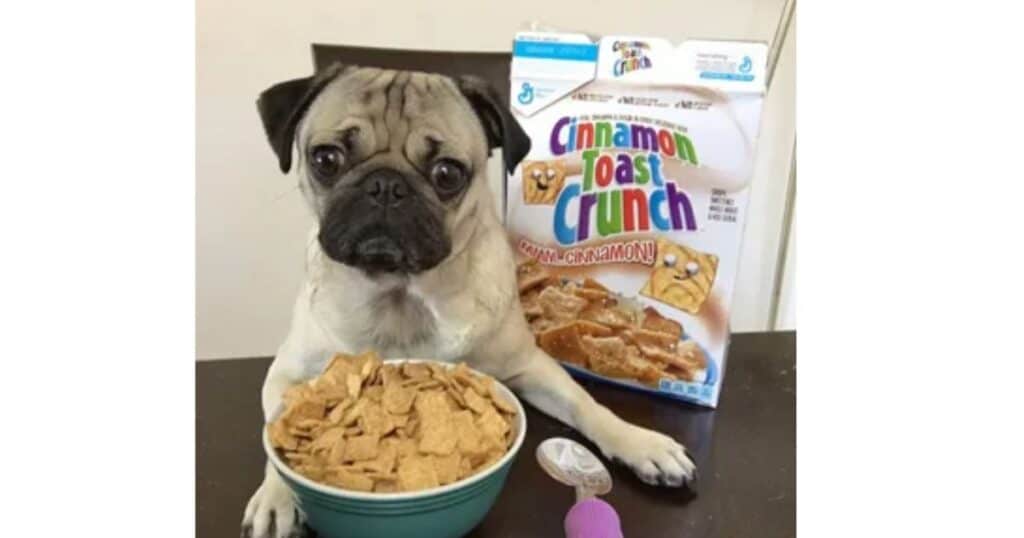As a dog owner, you may have wondered about the safety of sharing your favorite snacks with your furry friend. One popular breakfast cereal, Cinnamon Toast Crunch, might seem like a tasty treat to share, but is it safe for dogs? This comprehensive guide explores whether dogs can eat Cinnamon Toast Crunch safely and provides valuable information on the ingredients, potential risks, and safe alternatives. By the end, you’ll have a clear understanding of how to keep your dog healthy and happy while treating them.
Understanding Cinnamon Toast Crunch

Cinnamon Toast Crunch is a beloved breakfast cereal enjoyed by many in the USA and UK. This crunchy, sweet cereal is known for its distinctive cinnamon flavor and sugary coating. Created by General Mills, Cinnamon Toast Crunch has been a staple in many households since its introduction in 1984. It’s often eaten with milk, which adds to its appeal.
Popularity
Cinnamon Toast Crunch’s popularity extends beyond the breakfast table. It’s a favorite snack for kids and adults alike, and its unique flavor has inspired a range of products, from cereal bars to ice cream. However, its appeal doesn’t necessarily make it a safe choice for pets.
Nutritional Content
| Nutrient | Amount per Serving (1 cup) |
| Calories | 130 |
| Sugar | 9g |
| Fat | 3g |
| Sodium | 180mg |
| Carbohydrates | 25g |
| Fiber | 2g |
| Protein | 2g |
While Cinnamon Toast Crunch is tasty, its high sugar content and additives raise concerns when considering it for dogs. Let’s dive into the specifics.
Ingredients and Risks
To determine if dogs can eat Cinnamon Toast Crunch safely, it’s essential to examine its ingredients. Understanding these components helps identify potential risks.
Primary Ingredients
Cinnamon Toast Crunch contains:
- Whole grain wheat
- Sugar
- Rice flour
- Canola oil
- Fructose
- Maltodextrin
- Dextrose
- Salt
- Cinnamon
- Soy lecithin
- Trisodium phosphate
- BHT (a preservative)
Artificial Additives
The cereal’s artificial additives, such as BHT (butylated hydroxytoluene), a common preservative, can be harmful to dogs. Although BHT helps extend the shelf life of food products, it’s known to cause issues in high quantities, including potential carcinogenic effects. Dogs have more sensitive digestive systems than humans, making them more vulnerable to such additives.
Sugar Content
Cinnamon Toast Crunch is laden with sugar, which poses several risks for dogs. High sugar intake can lead to obesity, dental problems, and diabetes in dogs. Unlike humans, dogs don’t require sugar in their diet, and even small amounts can have adverse effects over time.
Can Dogs Eat Cinnamon?
To address whether dogs can eat Cinnamon Toast Crunch, we first need to understand if cinnamon itself is safe for dogs.
Cinnamon Overview
Cinnamon, derived from the bark of Cinnamomum trees, is commonly used as a spice in various cuisines. There are two main types: Ceylon cinnamon and Cassia cinnamon. Both types are used in cooking, but Cassia cinnamon is more commonly found in commercial products due to its lower cost.
Cinnamon in Dog Food
Some commercial dog foods and treats contain small amounts of cinnamon, mainly for flavor. In these controlled quantities, cinnamon is generally safe for dogs and can even offer some health benefits, such as anti-inflammatory properties and improved digestion.
Health Benefits
In small doses, cinnamon can provide health benefits for dogs, including:
- Anti-inflammatory properties: Helps reduce inflammation and joint pain.
- Antioxidants: Protects cells from damage caused by free radicals.
- Blood sugar regulation: May help regulate blood sugar levels.
However, it’s crucial to remember that these benefits come from small, controlled amounts of cinnamon.
Potential Risks of Feeding Cinnamon to Dogs

While cinnamon can be beneficial in moderation, overconsumption poses several risks.
Digestive Issues
Large amounts of cinnamon can irritate a dog’s digestive system, leading to stomach upset, vomiting, and diarrhea. Dogs’ digestive systems are not equipped to handle high quantities of spices, which can cause discomfort and health issues.
Allergic Reactions
Some dogs may have allergic reactions to cinnamon. Symptoms of an allergic reaction include:
- Itching
- Swelling
- Difficulty breathing
- Skin rashes
If you notice any of these symptoms after your dog consumes cinnamon, seek veterinary assistance immediately.
Toxicity Levels
Cinnamon is not toxic to dogs in small amounts, but consuming large quantities can be harmful. Cassia cinnamon, in particular, contains high levels of coumarin, a compound that can cause liver damage and blood thinning if ingested in significant amounts.
The Role of Milk
Cinnamon Toast Crunch is often consumed with milk, which adds another layer of concern for dog owners.
Lactose Intolerance
Many dogs are lactose intolerant, meaning they lack the enzyme lactase needed to digest lactose, the sugar found in milk. Consuming milk can lead to digestive issues such as:
- Diarrhea
- Bloating
- Gas
- Stomach pain
Milk in Cinnamon Toast Crunch
Cinnamon Toast Crunch may be enjoyed dry or with milk. However, adding milk increases the risk of digestive problems for dogs. Even if your dog isn’t lactose intolerant, the combination of sugary cereal and milk can still upset their stomach.
Is Cinnamon Toast Crunch Safe for Dogs?
After examining the ingredients and potential risks, it’s clear that Cinnamon Toast Crunch is not a safe treat for dogs.
Nutritional Analysis
The cereal’s high sugar content, artificial additives, and potential allergens make it an unhealthy choice for dogs. While the occasional small piece may not cause immediate harm, regular consumption or larger quantities can lead to serious health issues.
Expert Opinions
Veterinarians generally advise against feeding dogs human foods high in sugar and artificial additives. Dr. Jennifer Coates, a veterinary advisor, states, “Dogs have different dietary needs than humans, and foods high in sugar and artificial ingredients can contribute to health problems like obesity, diabetes, and digestive issues.”
Risk Assessment
Considering the potential risks of digestive upset, allergic reactions, and long-term health issues, Cinnamon Toast Crunch is not a suitable snack for dogs. It’s best to avoid giving this cereal to your furry friend altogether.
Signs of Cinnamon Poisoning
If your dog ingests a significant amount of cinnamon or Cinnamon Toast Crunch, watch for signs of cinnamon poisoning.
Symptoms
Symptoms of cinnamon poisoning in dogs include:
- Vomiting
- Diarrhea
- Coughing
- Low blood sugar
- Changes in heart rate
- Liver damage
Severity
The severity of symptoms depends on the amount consumed and the size of the dog. Smaller dogs are more susceptible to adverse effects due to their lower body weight.
Immediate Actions
If you suspect your dog has ingested a harmful amount of cinnamon or Cinnamon Toast Crunch, contact your veterinarian immediately. Early intervention can prevent serious health complications.
What to Do If Your Dog Ingests Cinnamon Toast Crunch
First Aid Steps
- Stay Calm: Panicking can make the situation worse. Remain calm and assess your dog’s condition.
- Remove Access: Ensure your dog can’t eat any more of the cereal.
- Check Symptoms: Observe your dog for any symptoms of distress or poisoning.
- Contact Your Vet: Call your veterinarian for advice. Provide details about what and how much your dog ate.
When to Call the Vet
Seek immediate veterinary care if your dog exhibits severe symptoms such as vomiting, diarrhea, difficulty breathing, or changes in heart rate. Early treatment is crucial to prevent serious health issues.
Possible Treatments
Your vet may recommend treatments such as:
- Inducing vomiting (only under professional guidance)
- Administering activated charcoal to absorb toxins
- Providing IV fluids to prevent dehydration
- Monitoring and supportive care for severe cases
Alternatives to Cinnamon Toast Crunch for Dogs
Instead of sharing Cinnamon Toast Crunch, consider these dog-friendly alternatives that are both safe and nutritious.
Dog-Friendly Cereals
Some cereals can be safe for dogs in small amounts. Look for options without added sugar or artificial ingredients, such as:
- Plain Cheerios
- Rice Krispies
- Bran flakes
Homemade Dog Treats
Making homemade dog treats ensures you control the ingredients and avoid harmful additives. Here are a few simple recipes:
- Peanut Butter and Banana Biscuits
- Ingredients: Whole wheat flour, ripe banana, peanut butter, water.
- Instructions: Mix ingredients, roll out dough, cut into shapes, and bake at 350°F for 20 minutes.
- Pumpkin Oat Treats
- Ingredients: Rolled oats, canned pumpkin, eggs, water.
- Instructions: Combine ingredients, shape into balls, and bake at 350°F for 25 minutes.
Nutritional Benefits
Homemade treats can provide essential nutrients without the risks associated with processed foods. Using ingredients like pumpkin, peanut butter, and oats offers health benefits such as improved digestion, healthy fats, and fiber.
Safe Human Foods for Dogs
Not all human foods are off-limits for dogs. Here are some safe options:
Fruits and Vegetables
- Apples (without seeds)
- Carrots
- Blueberries
- Green beans
- Sweet potatoes
These fruits and vegetables offer vitamins, fiber, and antioxidants beneficial for your dog’s health.
Proteins and Grains
- Cooked chicken
- Plain turkey
- Brown rice
- Quinoa
- Plain yogurt (for dogs not lactose intolerant)
These protein sources and grains provide essential nutrients like protein, vitamins, and minerals.
Moderation and Balance
While sharing these human foods is generally safe, it’s important to do so in moderation. Overfeeding can lead to nutritional imbalances and health issues. Always consult your veterinarian before introducing new foods to your dog’s diet.
How to Safely Treat Your Dog

General Guidelines
- Research First: Ensure the food is safe for dogs.
- Small Portions: Start with small amounts to monitor reactions.
- Avoid Harmful Foods: Steer clear of toxic foods like chocolate, grapes, and onions.
- Healthy Choices: Opt for natural, whole foods over processed snacks.
Common Mistakes
- Overfeeding: Giving too many treats can lead to obesity.
- Ignoring Ingredients: Not checking for harmful additives or allergens.
- Feeding Toxic Foods: Accidentally giving foods toxic to dogs due to lack of awareness.
Vet Recommendations
Veterinarians recommend prioritizing dog-specific treats and foods designed to meet their nutritional needs. If you choose to share human foods, do so sparingly and ensure they are safe.
Homemade Treats for Dogs
Simple Recipes
- Peanut Butter and Oat Biscuits
- Ingredients: Rolled oats, peanut butter, eggs, water.
- Instructions: Mix, shape into balls, bake at 350°F for 20 minutes.
- Sweet Potato Chews
- Ingredients: Sweet potatoes.
- Instructions: Slice into thin strips, bake at 250°F for 3 hours.
Nutritional Benefits
Homemade treats using ingredients like oats, peanut butter, and sweet potatoes provide health benefits such as fiber, healthy fats, and vitamins.
Storage Tips
Store homemade treats in an airtight container to keep them fresh. Refrigerate or freeze for longer shelf life.
Healthy Treats for Dogs
Store-Bought Options
Some healthy store-bought treats include:
- Blue Buffalo Health Bars
- Zuke’s Mini Naturals
- Wellness Soft Puppy Bites
Nutritional Content
Look for treats with natural ingredients, no artificial additives, and low sugar content. Check the nutritional information to ensure they align with your dog’s dietary needs.
Best Brands
Brands known for healthy dog treats include:
- Blue Buffalo
- Wellness
- Merrick
- Zuke’s
These brands focus on natural ingredients and nutritional value.
Sharing Food Safely with Your Dog

Do’s and Don’ts
Do’s:
- Research foods before sharing.
- Offer small portions.
- Monitor for any adverse reactions.
- Consult your vet regularly.
Don’ts:
- Don’t give toxic foods like chocolate, grapes, or onions.
- Avoid foods with high sugar or artificial additives.
- Don’t overfeed treats, even if they’re safe.
Common Myths
- Myth: All human foods are dangerous for dogs.
- Fact: Many human foods are safe in moderation, but some are harmful.
- Myth: Dogs need variety in their diet like humans.
- Fact: Dogs thrive on consistent, balanced nutrition tailored to their needs.
Education and Awareness
Educating yourself about dog nutrition helps make informed choices about what to share with your pet. Regularly consult your veterinarian and stay updated on safe and harmful foods.
By following these guidelines, you can ensure your dog enjoys safe, healthy treats without compromising their well-being. Remember, when in doubt, always err on the side of caution and consult a professional.
Conclusion
Ensuring the health and safety of your dog is a top priority for any pet owner. While sharing a snack like Cinnamon Toast Crunch might seem harmless, it carries significant risks for your furry friend. The high sugar content, artificial additives, and potential allergens make it an unhealthy choice for dogs. Additionally, the potential for digestive issues and allergic reactions further underscores the importance of keeping this cereal out of your dog’s diet.
Instead, focus on providing safe and nutritious alternatives. Plenty of human foods, such as certain fruits, vegetables, and lean proteins, can be safely shared with dogs in moderation. Homemade dog treats also offer a healthy and controlled option for rewarding your pet.
By understanding the ingredients and risks associated with foods like Cinnamon Toast Crunch, you can make informed decisions that promote your dog’s health and well-being. Always consult your veterinarian when introducing new foods to your dog’s diet, and prioritize treats specifically designed for dogs.
Ultimately, the best way to show love to your pet is through a balanced, nutritious diet and mindful treat choices. Your dog relies on you to make safe decisions, so stay educated and cautious about what you share. By doing so, you’ll ensure many happy, healthy years with your beloved companion.
MORE POST: What To Do If Your Dog Ate Goose Poop: A Comprehensive Guide
FAQ’s
Is Cinnamon Toast Crunch safe for dogs?
No, Cinnamon Toast Crunch is not safe for dogs due to its high sugar content, artificial additives, and potential allergens. It can cause digestive issues and long-term health problems.
Is Cinnamon Toast Crunch safe?
While safe for human consumption, Cinnamon Toast Crunch is not suitable for dogs. The cereal contains high levels of sugar and artificial additives, which can harm dogs.
Can dogs eat crunchy toast?
Plain, unseasoned toast in small amounts is generally safe for dogs. However, avoid giving toast with butter, cinnamon, or any other toppings that could be harmful.
Are Cheerios OK for dogs?
Yes, plain Cheerios are generally safe for dogs in moderation. They are low in sugar and free of harmful additives, making them a better option than sweetened cereals.
Can dogs be allergic to cinnamon?
Yes, dogs can be allergic to cinnamon. Symptoms of an allergic reaction include itching, swelling, and difficulty breathing. Always introduce new foods in small amounts.
What foods are toxic to dogs?
Foods toxic to dogs include chocolate, grapes, raisins, onions, garlic, and avocados. Always keep these foods out of your dog’s reach to prevent poisoning.

Davin Connor is an experienced author with 3 years in pets writing. Known for concise, informative content, he shares expertise on pet care, behavior, and health through his engaging articles.






